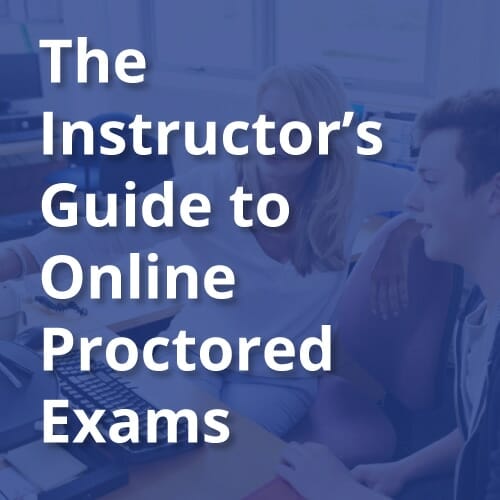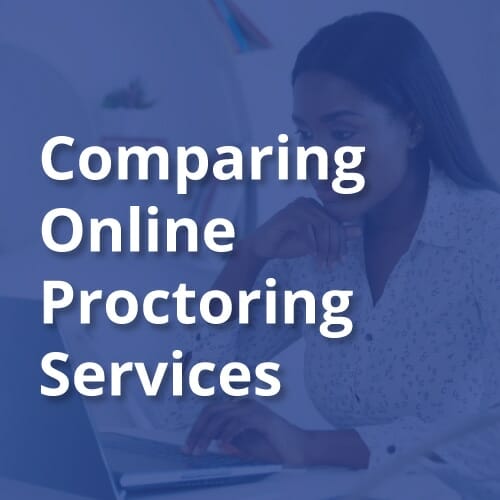Imagine what would have happened to colleges and universities in 2020 without the online education technology to allow teaching and learning to continue as it did. OK, stop! It was painful enough for those who had never used such technology before but imagine a complete shutdown of all higher education that a similar pandemic would have caused just 10 or 15 years ago.
Click below to get information about quickly implementing online proctoring if your institution is moving to online learning related to COVID.
The good news for students who want to learn and teachers who want to teach is that most schools were able to respond. Some did it seamlessly, many did it heroically, and they all did it during an unprecedented crisis that hit hard in March 2020 and kept presenting new challenges throughout the year. People who had never before heard the words “online proctored exam” became creative test builders or savvy online test takers within a month. While the uncertain times continue into the winter, even as the first vaccines are being administered, let’s take a look at how today’s online education technology has helped institutions cope with remote schooling.
Old Hands at Online Education
Many schools have offered online courses toward degree programs for the past five, 10, or 20 years. Even schools known for their in-person undergraduate and graduate programs, such as Harvard, Columbia, and the University of Southern California have offered online courses.
Students from all over the world could take courses in those universities’ distance learning programs, which allowed the schools to expand their mission and—sometimes over the objections of those who feared that academic standards would suffer—enter a lucrative market. Locally, meanwhile, online courses could help traditional students catch up if, for example, they had to take a semester off for personal or financial reasons.
Transition-Ready
Schools that already invested in their own systems were better placed to convert their courses to an online environment, even if the majority of their faculty had never taught online before. To be sure, instructors had to put in an immense amount of work to learn new software and, in many cases, reconceptualize their courses for an online environment. The psychological toll may take years to work itself out, and, while digital transformation can’t be considered a panacea for all that ails higher education, the success stories from this era will certainly contribute to an expanded sense of what’s possible, both now and in the future.
Video Classrooms and Conferencing
As noted, in some schools, the capability to run courses online has been developing for some time, and the support of companies that provide online test proctoring services has also been growing. The ability for instructors to see and hear 25 or more students on-screen at once has become widespread, even if it was only encountered for the first time during the COVID-19 crisis. Students can ask questions of teaching assistants in real-time chat boxes and smaller numbers can meet in online “breakout rooms” for focused discussions and group work.
Many schools without their own dedicated online classroom platforms were able to adapt their video conferencing services that were not originally set up with universities in mind. These services were able to help in a pinch and also allowed instructors and tech staffers to learn what works and what needed to improve with a given interface and student experience as they planned for the future.
How One School Quickly Integrated Online Proctored Exams
When it came time for course assessments, particularly high stakes midterm and final exams, companies such as Honorlock stepped into the breach to help schools maintain academic integrity even as an exponentially greater number of students took web proctored exams for the first time.
Like many schools, Broward College had to react fast. As one of the United States’ largest community colleges, Broward serves approximately 67,000 students, many of whom are the first in their families to pursue their formal education beyond high school. To fulfill their promise to these students in the face of the pandemic, Broward went full steam ahead to transition courses to a fully online environment. Naturally, they faced many of the same obstacles other schools did, as well as those unique to their community. They needed an online proctoring solution that would become a true resource, not an additional problem.
Data Privacy and Building Trust
Daphne St. Val, Senior Instructional Designer at Broward, noted that students were initially concerned about their privacy, but “little by little,” she said, they became comfortable: “When you install the [lightweight Chrome browser] extension, it’s not tapping into anything other than what you do during your screen sharing.”
Support for Faculty and Students
Many instructors and students struggled during the beginning of the pandemic due to the rushed learning curve associated with video-based courses and online test proctoring systems. In contrast, Honorlock users reported relief. “Having access to 24/7/365 support is huge, said St. Val. Especially during times like this when students may be taking exams at any time of day. You want them to have access to someone who can troubleshoot with them.”
Exclusive Online Proctoring Features You Can’t Get Anywhere Else
Three exclusive features that St. Val said particularly sets Honorlock apart from other online proctoring solutions are Live Pop-In™, Search and Destroy™, and Multi-Device Detection. In brief, our AI monitors each exam and only notifies our always-available human proctors when a possible violation of academic integrity (e.g., another voice in the room, a student getting up from the desk) has occurred. Meanwhile, our proprietary software searches the internet for unauthorized copies of the instructor’s test questions and issues copyright take-down orders from question-pool sites. We can also detect whether a student searches for test questions with a smartphone or tablet during the exam itself.
You can see more about Broward’s success story, and those of a range of other schools, here.
Into the Future
As students take more and more classes online, we may look back on this pandemic nightmare as the beginning of a brighter future for instructors and students. A future that provides instructors and students with broader capabilities to teach and learn, offer classes, and remotely proctor exams to ensure student success.
Want to see Honorlock in action? Request a demo.



